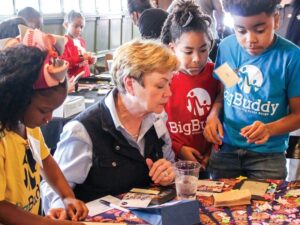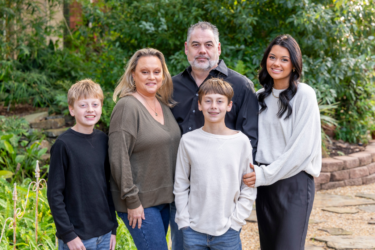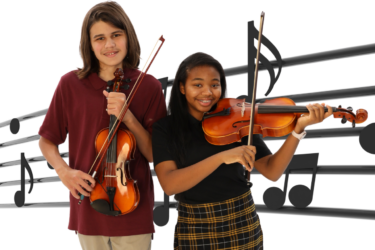Forty years ago, an LSU psychology class started a class project after their teacher decided they should have an off-campus mentoring experience. The students partnered with a local woman who was running a daycare center in her home, and when the class ended, the students decided to continue working with the kids. As the mentoring group began to grow, Jim Geiser decided he wanted to make it a formal organization and became the first executive director of what is now known as Big Buddy.
Big Buddy’s mission, says current executive director Gaylynne Mack, is to form relationships between adults and young people that will help to inspire them and advance them into successful members of the community. Currently, Big Buddy serves 500 young people per day. The organization does so in three ways: one-on-one mentoring, after school programs, and workforce development.
For one-on-one mentoring, Big Buddy pairs a child, who is at least in the third grade and younger than 18, with an adult mentor. The mentors act as a role model to the mentees, guiding them to make positive choices and to develop career and life skills as they reach adulthood.
“We want to establish that mentoring is a powerful tool to fight the negativity that happens in our community,” says Mack. “When we talk about risk factors and ‘blockages’ to community growth, we look at crime, lack of education, and poverty. When you, as an adult, can reach back and help someone else, it breaks not only the cycle of failure but helps you become a better citizen.”
Big Buddy hosts after-school programs in Baton Rouge schools. The organization finds low-performing schools or schools with a high population of low-income students and implements enrichment activities. Students participate in things like student government, drama classes, and STEM, all of which is funded through grants.
For older students, Big Buddy offers workforce development through Level Up. Students are paired with a mentor in their potential field of interest, and the mentors train the students over an eight week period.
Mack says mentoring is not just for the children in the community. Both mentor and mentee get something positive out of the relationship, which is how communities change. Mack loves to see previous mentees come back to serve as mentors with Big Buddy.
“We have several legacies, or people who grew up in the program, who have gone on to get degrees and come back to tell their stories,” says Mack. “I couldn’t say then what a big impact it was having, but now, seeing the kids I worked with, I see them with their own families and they all have successes they can trace back to Big Buddy.”
Mack explains that one of the most challenging aspects of her job is continuously convincing people in the public that taking care of young people is the way to have a better community. “If we understood the importance of our youth, we wouldn’t have to work so hard to keep Big Buddy funded,” she says. “If we don’t take care of them, we won’t reach success.” ■





